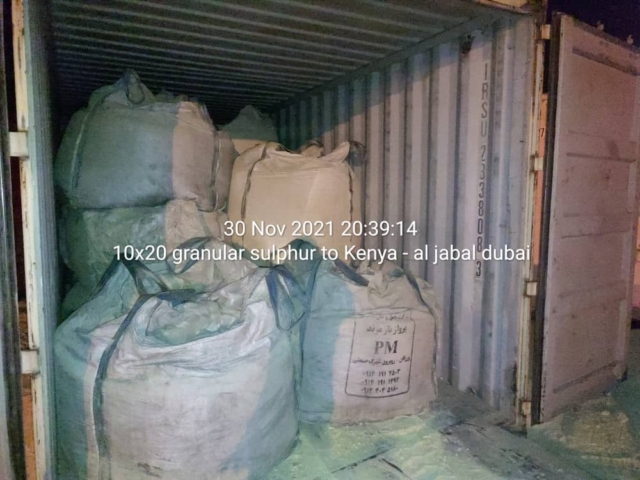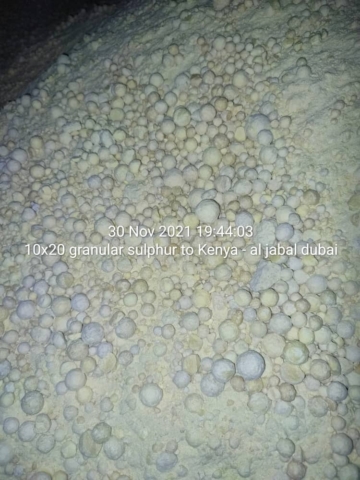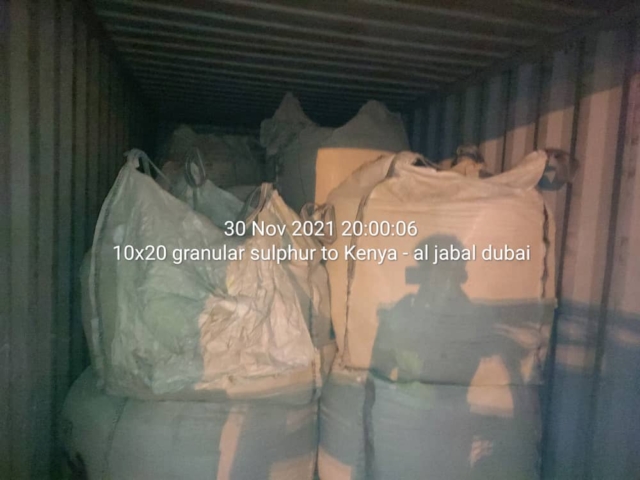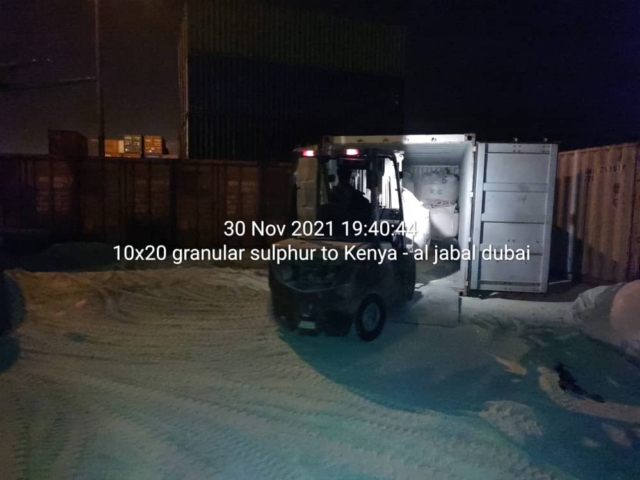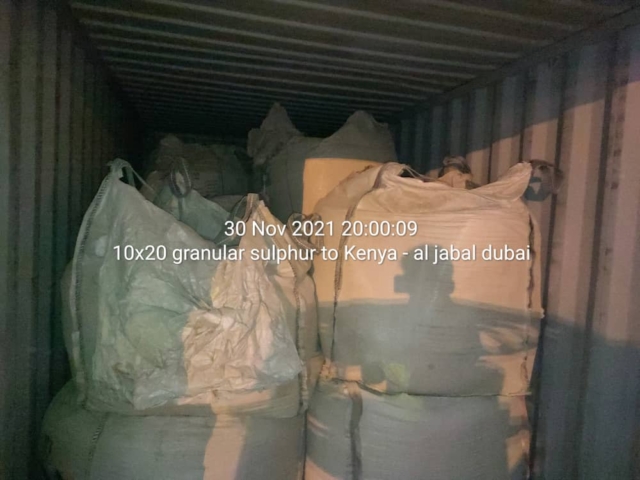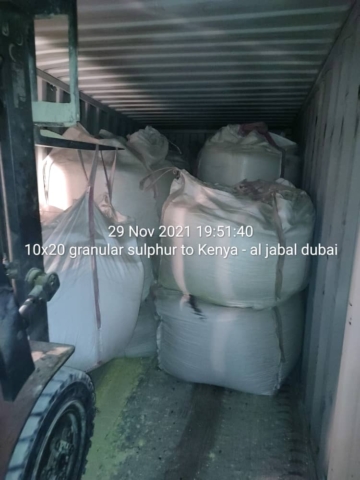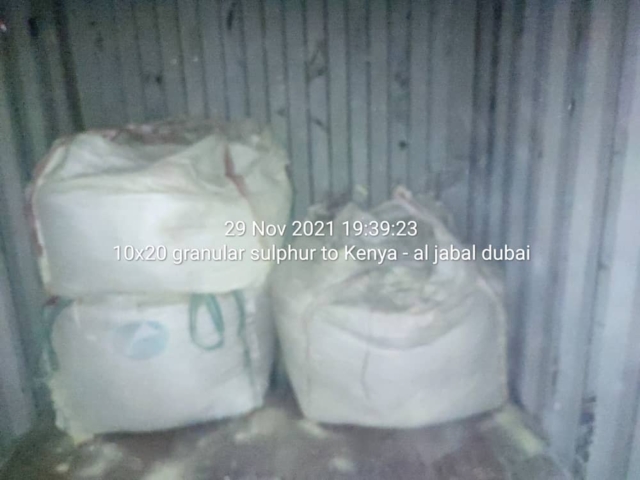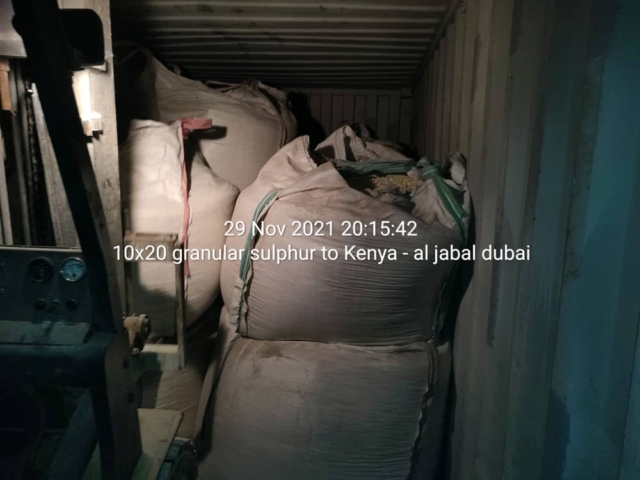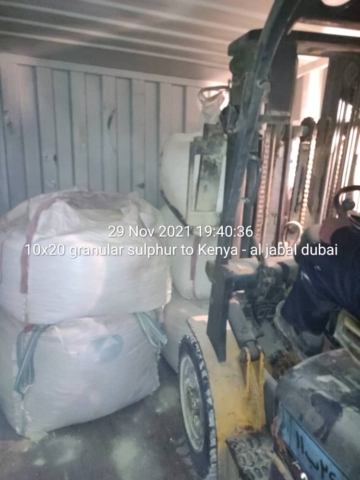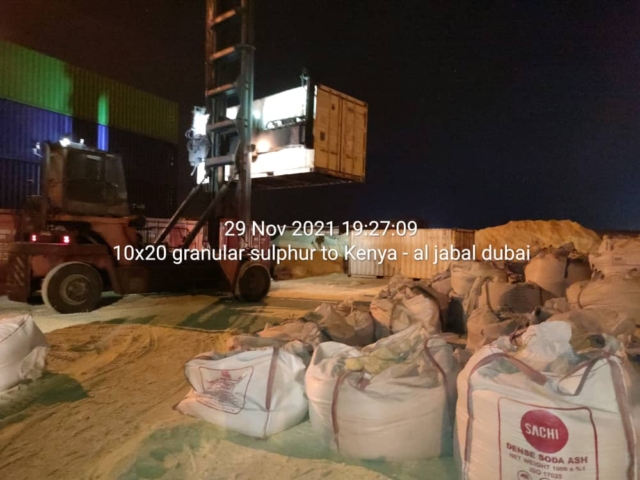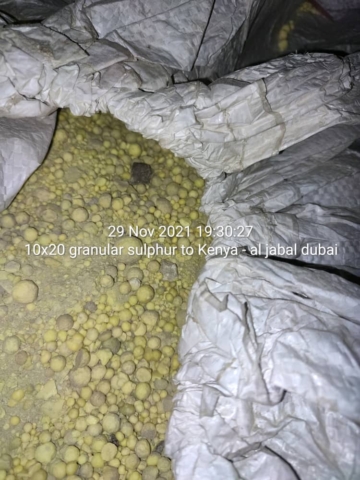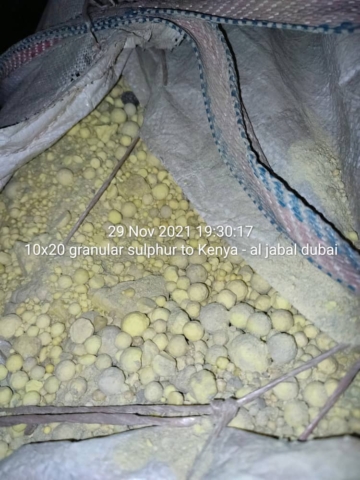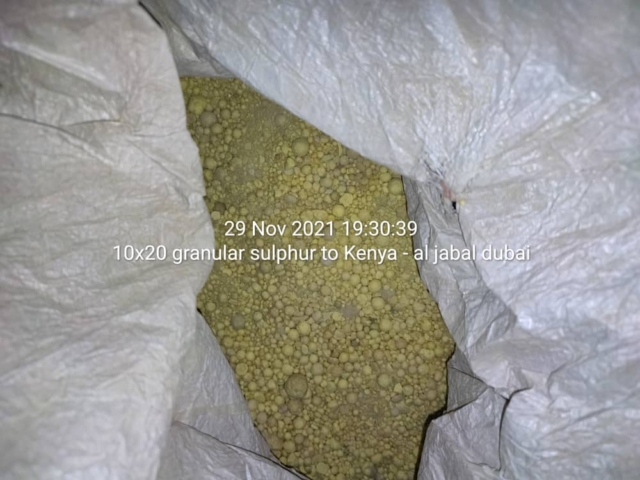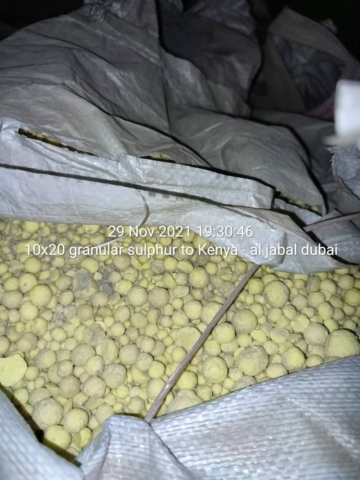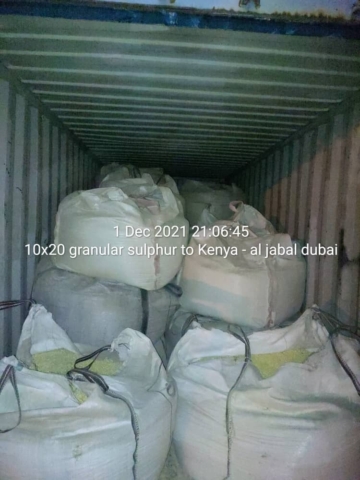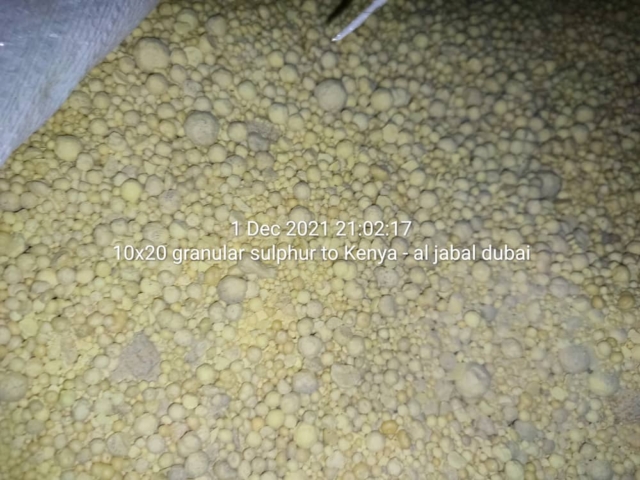10 Containers Granular Sulphur Shipment to Kenya, November 2021 – Exported by Al Jabal Holding
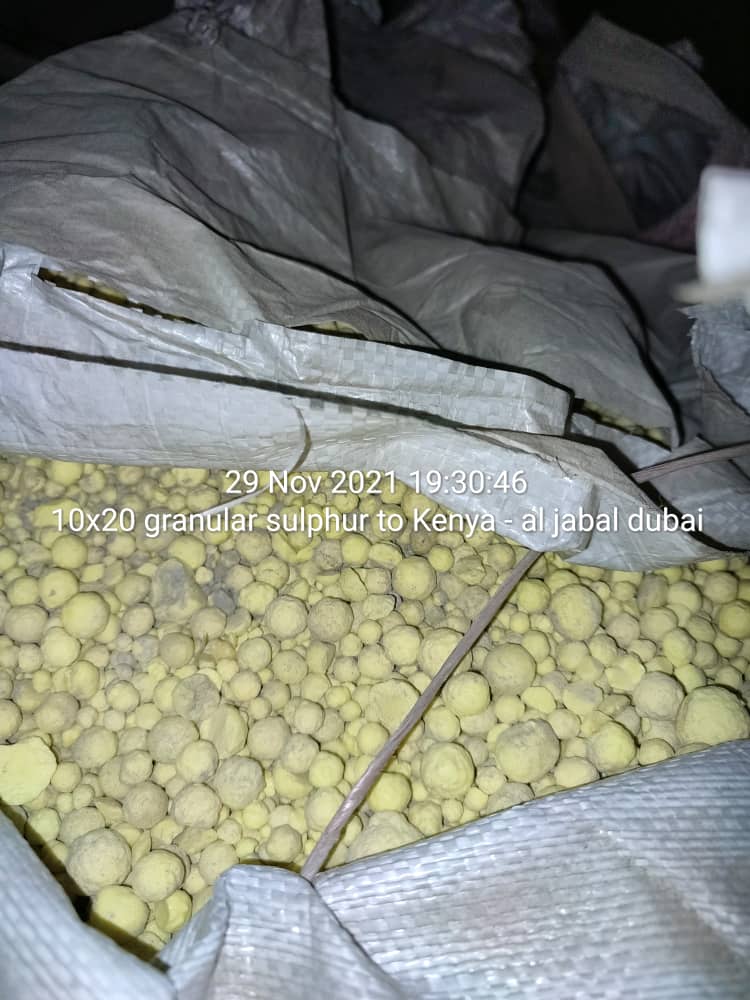
In November 2021, a significant shipment took place that solidified Al Jabal Holding’s presence in the East African market—10 containers of granular sulphur were exported to Kenya. This wasn’t just another trade transaction; it marked a pivotal moment in the supply chain for agricultural and industrial sectors in Kenya. The demand for granular sulphur in East Africa has grown rapidly over the past decade, with Kenya emerging as a central hub due to its increasing focus on agriculture, infrastructure, and industrial chemicals.
Al Jabal Holding’s move to export such a large volume of sulphur in a single shipment not only underlines the company’s export capability but also highlights the growing trust African markets place in UAE-based exporters. The shipment comprised high-grade granular sulphur tailored to meet international quality standards. Transported via 10 × 20-foot containers, this logistics milestone was backed by a strong compliance framework, ensuring everything from packaging to port clearance was handled with precision.
From the loading docks at Jebel Ali Port to the Port of Mombasa in Kenya, this operation was a masterclass in export efficiency.
Introduction to Al Jabal Holding’s Export Milestone
Who is Al Jabal Holding?
Al Jabal Holding, also known as Al Jabal Global Trading FZE, is a reputable trading powerhouse based in the UAE, known for exporting industrial and chemical materials to various global markets. Specializing in commodities like sulphur, urea, bitumen, and fertilizers, the company has built a strong network across Asia, the Middle East, and Africa. Their operations are grounded in quality control, logistics excellence, and deep knowledge of commodity markets.
For over a decade, Al Jabal has focused on connecting producers from the Gulf region with buyers across emerging economies. Their success is built on reliability, timely deliveries, and maintaining international standards in trade practices.
With Kenya being a rising star in Africa’s economic landscape, it was only a matter of time before Al Jabal seized the opportunity to establish a stronger presence. The shipment was not just about fulfilling an order; it was about reinforcing a supply relationship that could last for years.
Significance of the November 2021 Shipment
November 2021 was a turning point. Coming off the economic uncertainties triggered by the COVID-19 pandemic, global supply chains were still struggling. For Al Jabal Holding to push through and successfully manage a 10-container export was a significant feat. It proved their resilience, their logistical readiness, and their unwavering commitment to meet market demands regardless of global disruptions.
Moreover, this shipment wasn’t merely about moving sulphur from point A to point B—it was about ensuring that Kenyan businesses had access to essential materials that power agriculture and manufacturing. With East Africa pushing for fertilizer independence and enhanced food production, the timing of this delivery couldn’t have been better.
Shipment Overview – What Was Exported
Understanding Granular Sulphur and Its Uses
Granular sulphur is a yellow, odourless chemical compound widely used in multiple industries, with agriculture being the largest consumer. It’s a key component in producing sulphuric acid, which is the primary ingredient in fertilizers. The granular form is especially popular because it’s easier to handle, store, and transport compared to powdered sulphur.
In Kenya, sulphur is primarily used in agriculture for soil conditioning, pest control, and fertilizer manufacturing. It’s also used in the rubber and mining industries. The versatility of granular sulphur makes it highly sought after, especially in developing countries aiming to boost agricultural yield and industrial output.
By shipping granular sulphur instead of bulk powder, Al Jabal ensured safer handling, reduced waste, and improved delivery efficiency. The quality was consistent, with purity levels exceeding 99.5%, meeting both UAE and Kenyan regulatory standards.
Volume, Packaging, and Specifications of the Shipment
The shipment consisted of 10 containers (20-foot) each fully loaded with granular sulphur. Each container carried roughly 25 to 27 metric tons, translating to an approximate total of 250–270 metric tons of granular sulphur. The sulphur was packed in 1000 kg jumbo bags, which were securely placed on pallets to avoid movement during transport.
The specifications were as follows:
- Purity: 99.5% minimum
- Moisture: Less than 0.1%
- Granule size: 1–3 mm
- Packaging: Jumbo bags with polyethylene liners
- Labeling: Clearly marked with shipment details, origin, batch number, and handling instructions
This attention to detail ensured smooth customs clearance in both UAE and Kenya and reduced the risk of damage or rejection due to packaging issues. Al Jabal’s use of standard international packaging protocols was instrumental in ensuring that the product remained in pristine condition throughout the voyage.
Export Logistics and Timeline
Departure from UAE – Jebel Ali Port
The journey began at Jebel Ali Port, one of the most advanced and busiest seaports in the Middle East. Known for its world-class infrastructure and efficient customs process, Jebel Ali made it possible to organize and load all 10 containers swiftly.
Al Jabal used a well-known freight partner with experience in handling chemical cargo, ensuring compliance with IMO standards and maritime safety.
Arrival in Kenya – Port of Mombasa
After a 10 to 14-day voyage across the Arabian Sea and the Indian Ocean, the cargo arrived at Port of Mombasa, the main maritime gateway to East Africa. Mombasa’s connectivity to the rest of Kenya and inland East African markets made it an ideal destination.
Once unloaded, the sulphur was temporarily stored at a bonded warehouse before being released to the buyer. The clearance process was expedited due to complete documentation and prior inspection reports shared by Al Jabal.
Freight and Shipping Details
- Port of loading: Jebel Ali, Dubai, UAE
- Port of discharge: Mombasa, Kenya
- Vessel type: Container ship (20-ft capacity)
- Shipping time: 12 days (average)
- Shipping line: Confidential (known carrier with sulphur-handling expertise)
- Freight terms: CIF (Cost, Insurance, Freight)
- Insurance: Fully covered for marine risk
Al Jabal ensured transparent communication with the Kenyan consignee throughout the process.
Compliance, Certification, and Quality Assurance
Safety and Inspection Standards
When handling chemical commodities like granular sulphur, safety and compliance aren’t optional—they’re essential. Al Jabal Holding operates with a strict set of internal safety protocols aligned with international export standards. For this specific shipment to Kenya, the company ensured the entire logistics chain followed proper handling and inspection protocols from start to finish.
Before the sulphur even left the warehouse, a full inspection was conducted by an SGS-certified third-party quality control team. They verified the chemical composition, ensured that moisture content was well below the acceptable threshold, and assessed the physical integrity of the granular form. The sulphur was then packed in specially designed jumbo bags, each featuring polyethylene liners to prevent any leakage, contamination, or degradation during transit.
Certifications and Documentation Used
Al Jabal Holding ensured that every legal, trade, and safety requirement was addressed with certified documentation. Here’s a breakdown of the documents included in the November 2021 shipment:
- Certificate of Origin – issued by the Dubai Chamber of Commerce, confirming UAE as the country of manufacture.
- Bill of Lading – official transport document used for customs and delivery at the Port of Mombasa.
- Commercial Invoice – detailed pricing, quantity, and product specification.
- Packing List – itemizing each container’s content, including net weight and gross weight.
- SGS Inspection Certificate – third-party inspection report validating the chemical purity, grain size, and moisture levels.
- MSDS (Material Safety Data Sheet) – detailed safety and handling procedures.
- Certificate of Analysis (COA) – outlining the chemical makeup of the granular sulphur, lab-tested for accuracy.
By fulfilling these requirements, Al Jabal ensured a smooth customs clearance process and built confidence with the Kenyan importer regarding product quality and trade transparency.
The Kenyan Market and Sulphur Demand
Kenya’s Industrial and Agricultural Sulphur Needs
Kenya, often dubbed the gateway to East Africa, is experiencing rapid industrialization and agricultural transformation. Sulphur plays a central role in this evolution. In the agricultural sector, granular sulphur is used as a soil amendment to correct alkaline soils, enhance nutrient absorption, and protect against fungal diseases. With the government encouraging increased local food production, the demand for sulphur-based fertilizers has surged.
Furthermore, Kenya’s fast-growing mining and petrochemical industries also rely on sulphur for various refining and manufacturing processes. The increase in road construction, cement production, and chemical manufacturing has created a robust, sustained demand for sulphur in different forms—especially granular, due to its ease of application and handling.
In 2021, Kenyan imports of chemical raw materials, including sulphur, spiked as the government invested more in food security and industrial capacity. This demand surge created the perfect opportunity for reliable suppliers like Al Jabal Holding to step in with quality, consistency, and logistical precision.
The 10-container shipment was not just an order—it was a strategic entry into a booming market. By delivering granular sulphur on time, Al Jabal not only fulfilled a demand but also positioned itself as a go-to supplier for repeat business in the region.
Why Kenya is a Strategic Market for Sulphur Exporters
Kenya offers several unique advantages for sulphur exporters:
- Strategic Port Access: The Port of Mombasa is East Africa’s largest and busiest port, serving Kenya, Uganda, Rwanda, Burundi, and parts of the DRC. It enables exporters to use Kenya as a distribution hub.
- Growing Agrochemical Market: Kenya’s agriculture industry is expanding, particularly in maize, tea, sugarcane, and floriculture—all of which benefit from sulphur-enriched fertilizers.
- Free Trade Incentives: As a member of the East African Community (EAC) and the African Continental Free Trade Area (AfCFTA), Kenya enjoys tariff advantages and simplified cross-border procedures.
- Demand for Industrial Inputs: With industrialization accelerating, sulphur is a critical raw material for new manufacturing and processing plants.
- Business-Friendly Policies: Kenya has made strides in improving its trade policies, streamlining import licensing, and supporting private sector partnerships.
Given these advantages, Al Jabal Holding recognized that tapping into Kenya could unlock further opportunities in Uganda, Tanzania, and Rwanda—creating a regional footprint rather than a one-time export.
Building Strategic Partnerships in East Africa
Establishing Long-Term Distribution Channels
Al Jabal Holding didn’t treat the November 2021 shipment as a one-time business deal. Instead, it was a stepping stone toward building lasting partnerships in East Africa. To make the most of this opportunity, they actively engaged with local distributors, agricultural cooperatives, and industrial buyers across Kenya.
The strategy involved more than just delivery. Al Jabal provided potential buyers with access to product samples, technical documentation, and on-ground support. Their sales and logistics team worked in sync to ensure that Kenyan partners received real-time updates, timely responses to inquiries, and transparent trade terms. This level of service helped build trust—something essential in B2B trading.
They also explored strategic warehousing options within Kenya to streamline future deliveries. With local stockpiling, they could offer reduced lead times and better pricing flexibility. This foresight was crucial in an environment where seasonal demand for sulphur-based fertilizers can spike dramatically.
Moreover, Al Jabal tapped into Kenya’s robust logistics and distribution ecosystem to reach inland markets like Eldoret, Kisumu, and even extend supply to Uganda and Tanzania. These moves not only positioned the company for future sales but also for a regional leadership role in sulphur supply.
Collaborating with Local Authorities and Compliance Agencies
A key factor behind the success of this shipment was the strong collaboration with Kenyan authorities, including the Kenya Revenue Authority (KRA), Kenya Ports Authority (KPA), and the Kenya Bureau of Standards (KEBS).
By aligning with these institutions, Al Jabal could bypass unnecessary delays, avoid demurrage fees, and showcase its commitment to legal and ethical trade. These collaborations made a lasting impression on Kenyan stakeholders, many of whom expressed interest in long-term supply contracts.
Environmental and Economic Impact
Sustainable Trade Practices
In today’s world, sustainability isn’t just a buzzword—it’s a business imperative. Al Jabal Holding acknowledges the environmental responsibility that comes with exporting chemical products.
During transit, all containers were sealed to prevent any spillage or exposure. In addition, the company employed a reverse logistics model for packaging waste, offering partners options to return used jumbo bags for proper recycling or reuse.
By integrating these eco-friendly practices, Al Jabal not only reduced their environmental footprint but also appealed to Kenya’s growing emphasis on green policies, especially in agriculture and trade.
Economic Contribution to Kenya’s Development Goals
This shipment also contributed significantly to Kenya’s Big Four Agenda, particularly in the areas of food security and industrial growth. With the granular sulphur utilized in fertilizer production, local farmers gained access to improved inputs, which translated to higher yields and better income.
On the industrial front, sectors such as mining and chemical processing benefited from the increased availability of quality raw materials. This shipment had a ripple effect—fueling supply chains, creating jobs in transport and distribution, and reinforcing Kenya’s standing as a hub for East African trade.
Customer Satisfaction and Feedback
Testimonials from the Kenyan Importer
After the successful delivery and distribution of the granular sulphur, feedback from the Kenyan buyer was overwhelmingly positive. According to the importer, “Al Jabal Holding delivered not just a product, but a promise. From the moment the shipment was booked until the cargo reached our site, every step was managed with professionalism and precision.”
The importer particularly appreciated the clarity of documentation, the prompt communication, and the consistency of the product quality. These factors played a major role in their decision to continue working with Al Jabal for future imports.
Such testimonials speak volumes about customer satisfaction and underscore the importance of service in building global trade relationships.
Lessons Learned and Improvements for Future Shipments
While the November 2021 shipment was largely successful, it wasn’t without learning experiences. Minor delays were noted in offloading due to port congestion at Mombasa. To counter this in future shipments, Al Jabal is now exploring alternative port booking slots and pre-arrival clearance services.
Additionally, they plan to integrate real-time GPS tracking for all future shipments, allowing customers to monitor container movements directly. These improvements demonstrate the company’s commitment to constant evolution and customer-first policies.
Future Outlook and Expansion Plans
Scaling Up Sulphur Exports to East Africa
Riding on the success of the 10-container shipment, Al Jabal Holding is actively working to scale up sulphur exports across East Africa. Their target is to ship up to 100 containers annually, covering Kenya, Uganda, Rwanda, and Ethiopia.
To meet this goal, they’re investing in advanced packaging facilities in the UAE and exploring joint ventures with East African distributors. These initiatives aim to cut costs, improve delivery timelines, and ensure year-round availability of granular sulphur in the region.
A key component of this expansion is the deployment of localized customer support teams. These teams will be tasked with addressing inquiries, managing deliveries, and providing technical support on the ground.
Exploring Product Diversification
While granular sulphur is the flagship product, Al Jabal is also considering diversification into related materials such as:
- Prilled Urea
- NPK Fertilizers
- Bitumen
- Gypsum
By offering a broader product portfolio, they aim to become a one-stop solution for agro-industrial clients in Africa. This strategic diversification will not only drive revenue but also cement their role as a trusted trade partner in the region.
Conclusion
The 10-container granular sulphur shipment to Kenya in November 2021 wasn’t just a delivery—it was a statement. It demonstrated Al Jabal Holding’s logistical strength, product reliability, and commitment to quality. More importantly, it opened the door to long-term relationships in East Africa and set the tone for future expansion in a rapidly developing market.
With an eye on sustainability, strategic partnerships, and regional integration, Al Jabal is not merely exporting products—they’re exporting solutions. And as demand for industrial inputs and fertilizers continues to grow across Africa, there’s no doubt that this shipment was only the beginning of something much larger.
FAQs
1. What is granular sulphur used for in Kenya?
Granular sulphur is primarily used in agriculture as a soil conditioner and fertilizer ingredient. It also supports industrial sectors like mining, chemical processing, and rubber manufacturing.
2. Why was this shipment significant for Al Jabal Holding?
The November 2021 shipment marked Al Jabal’s official entry into the East African market. It showcased their capacity to handle bulk chemical exports and meet international standards under tight timelines.
3. What certifications were included in the shipment?
Key documents included Certificate of Origin, Bill of Lading, Packing List, MSDS, SGS Inspection Certificate, and a Certificate of Analysis.
5. Will Al Jabal Holding expand its exports in East Africa?
Yes, Al Jabal is actively planning to increase its sulphur exports and introduce related products to meet growing demand in Kenya, Uganda, and surrounding regions.

